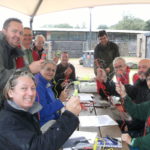Guy Pluckwell is a Senior Environment Officer for the Environment…
Acclimatize – addressing pollution in urban and rural bathing waters
Researchers in University College Dublin and Aberystwyth University in Wales have teamed up with stakeholders on Acclimatize, a large-scale multi-disciplinary research project focusing on bathing water quality and the potential impacts of climate change.
Acclimatize aims to identify and quantify the pollution streams affecting bathing waters and impacting on public health, and to determine how climate change will affect the quality of these bathing waters in the future.

The Acclimatize team is engaging closely with project partners and stakeholders, and using a combination of extensive fieldwork, laboratory analysis, and hydrology to gather information to build a picture of the current situation in Dublin Bay. The team is determining the faecal indicator bacteria (FIB) loading of bathing waters by animals and sediments, and the FIB flux from catchments to bathing waters.
Microbial source tracking approaches are used to identify the biological source of pollution. These data will be integrated into a combined near shore and catchment model to describe bathing water quality. These integrated models will subsequently be used to assess the potential impacts of climate change on bathing water quality.
This information will help policy-makers and local authorities to protect the valuable amenities and resources provided by bathing waters.
Beaches
In Ireland, the team is focusing on Sandymount, Merrion and Dollymount strands in Dublin Bay.

In Wales, the team commenced with Cemaes Bay in Anglesey in 2017, and in 2018 focused on New Quay North and Traeth Gwyn New Quay. In 2019, the team will be based at Nolton Haven in Pembrokeshire. The bathing waters in these contrasting environments are affected by different factors, and will likely experience varying effects from climate change.
Partners and stakeholders

(DCC), Professor Wim Meijer (UCD), Ronan Kane (IW), Kevin Callanan (DCC), Joanne
Chadwick (UCD), Carla McKenna (FCC), Adjunct Professor Bat Masterson (UCD),
Anthony Mannix (EPA) and Pat O’Halloran (DCC).
This €6.7 million project, which is part-funded by the European Regional Development Fund through the Ireland Wales programme, started in May 2017, and will run until October 2021.
The project is led by Professor Wim Meijer, Head of School of Biomolecular and Biomedical Science and Professor of Microbiology in UCD, and continues a successful collaborative partnership with Professor David Kay and his team in Aberystwyth University, Wales.
In UCD, a team including microbiologists, molecular biologists, engineers and computer scientists are working to identify and quantify pollution sources in Dublin Bay.
Complementing UCD’s focus on an urban catchment, the team in Aberystwyth University is focusing on bathing waters in rural agricultural catchments throughout Wales.
In Ireland, the Acclimatize team is working together with the Environmental Protection Agency, Dublin City Council, Dún Laoghaire- Rathdown County Council, Fingal County Council, Irish Water, and the Dublin Bay Biosphere Partnership.
In Wales, the team is working with Dŵr Cymru Welsh Water, Natural Resources Wales, and representatives of Welsh Local Government, the Welsh Government, and relevant non-governmental organisations through the Wales, Water and Health Partnership: Bathing Waters subgroup.
Joanne Chadwick, Acclimatize Project Manager, UCD
Find out more:
Twitter: @AcclimatizeEU
Email: joanne.chadwick@ucd.ie







